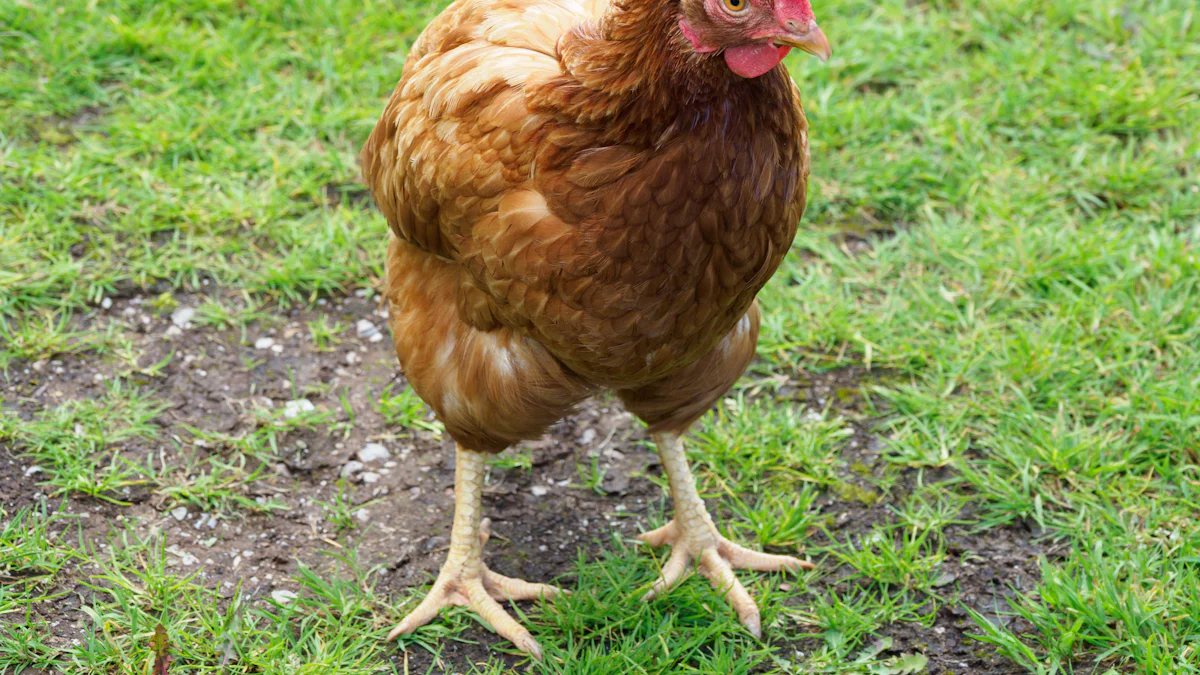
Chickens thrive on a diet rich in protein, and dried mealworms stand out as an exceptional source. Picky Neb Dried Mealworms deliver a concentrated protein content of up to 53%, making them a superior choice for poultry nutrition. This high-protein feed supports essential functions like growth, egg production, and feather health. Unlike other protein sources, dried mealworms combine efficiency with ease of use, offering a practical solution for chicken owners. Their nutrient-dense profile ensures chickens receive the vital elements needed to maintain optimal health and productivity.
Key Takeaways
- Picky Neb Dried Mealworms provide an impressive protein content of up to 53%, essential for chicken growth, egg production, and feather health.
- Incorporating these mealworms into your chickens’ diet ensures they receive vital nutrients like iron, potassium, and magnesium, promoting overall health and productivity.
- Choosing natural protein sources like mealworms over synthetic options supports chickens’ natural dietary habits and reduces the risk of adverse reactions.
- Mealworms are an eco-friendly choice, requiring minimal resources to produce and contributing to sustainable farming practices.
- Using Picky Neb Dried Mealworms as a treat can enhance training and bonding with your chickens, encouraging natural foraging behaviors.
- Mealworms are easy to store and use, with a long shelf life that simplifies feeding routines for chicken owners.
- Feeding guidelines suggest offering 10-15 grams of mealworms per chicken daily, adjusting based on flock size and specific nutritional needs.
Nutritional Benefits of Picky Neb Dried Mealworms
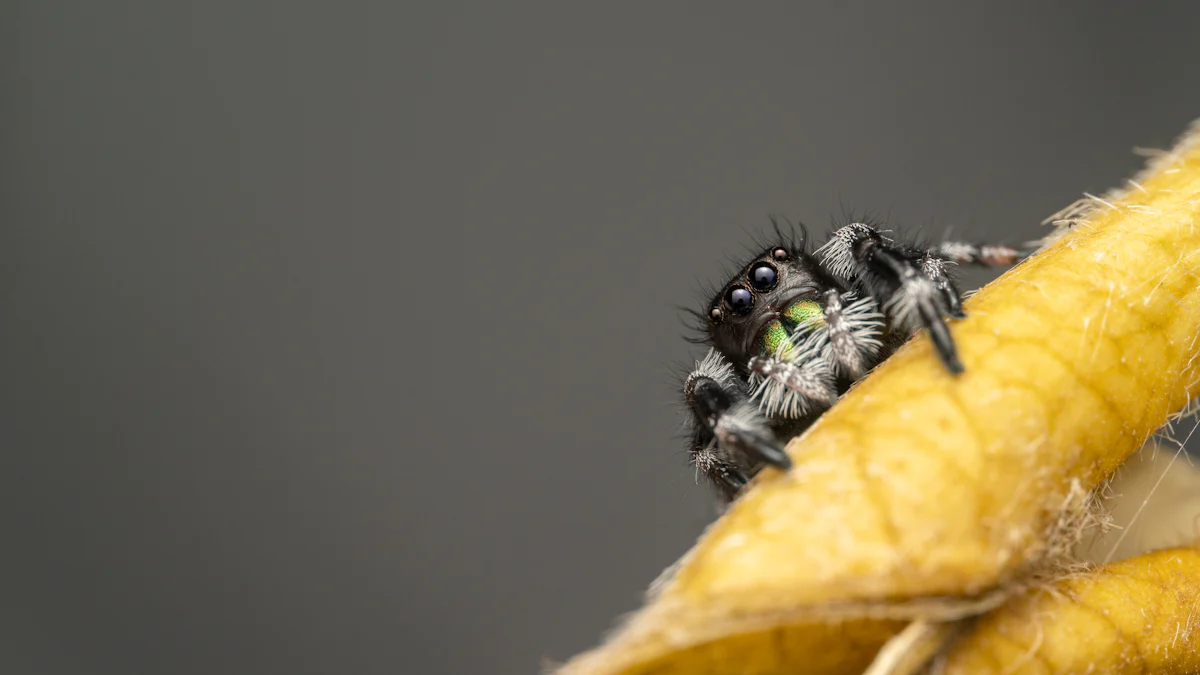
High Protein Content
Why protein is essential for chickens’ growth and productivity.
Protein plays a critical role in the growth and productivity of chickens. It supports muscle development, strengthens bones, and enhances overall body functions. For laying hens, protein is indispensable for producing high-quality eggs. Without sufficient protein, chickens may experience slower growth, reduced egg production, and poor feather quality. A protein-rich diet ensures that chickens remain healthy, active, and capable of meeting their natural productivity potential.
How Picky Neb Dried Mealworms provide a concentrated source of protein.
Picky Neb Dried Mealworms stand out as a premium protein source for chickens. With an impressive protein content of up to 53%, these mealworms deliver the concentrated nutrition chickens need to thrive. Unlike other protein sources, they are non-GMO and free from preservatives or additives, ensuring a natural and safe option for poultry. Their high protein density makes them particularly beneficial during critical periods, such as winter or molting, when chickens require additional nutritional support. By incorporating these mealworms into their diet, chicken owners can provide a reliable and efficient protein boost.
Rich in Essential Nutrients
Key vitamins and minerals found in Picky Neb Dried Mealworms.
In addition to protein, Picky Neb Dried Mealworms are packed with essential vitamins and minerals. They contain vital nutrients like iron, potassium, and magnesium, which contribute to overall health and vitality. These nutrients play a significant role in maintaining strong bones, supporting metabolic functions, and boosting immunity. The balanced nutritional profile of these mealworms ensures that chickens receive more than just protein—they gain access to a comprehensive range of nutrients necessary for optimal well-being.
How these nutrients support egg production and feather health.
The vitamins and minerals in Picky Neb Dried Mealworms directly impact egg production and feather health. Iron and potassium enhance blood circulation, which is crucial for laying hens to produce healthy eggs. Magnesium supports calcium absorption, ensuring strong eggshells. Additionally, the nutrients promote vibrant, glossy feathers, which are essential for insulation and protection. Regular supplementation with these mealworms helps chickens maintain their natural beauty and productivity.
Natural and Sustainable
The benefits of using a natural protein source over synthetic supplements.
Natural protein sources like Picky Neb Dried Mealworms offer significant advantages over synthetic supplements. They provide a wholesome, chemical-free alternative that aligns with chickens’ natural dietary habits. Unlike synthetic options, these mealworms are easily digestible and free from artificial additives, reducing the risk of adverse reactions. Their natural composition ensures that chickens receive high-quality nutrition without compromising their health.
How mealworms are an eco-friendly option for chicken feed.
Mealworms are not only nutritious but also environmentally sustainable. They require minimal resources to produce, making them an eco-friendly choice for chicken feed. Unlike traditional protein sources like soy or fish meal, mealworms have a smaller carbon footprint and do not contribute to deforestation or overfishing. By choosing Picky Neb Dried Mealworms, chicken owners support sustainable farming practices while providing their flock with a superior protein source.
Comparison with Other Protein Sources
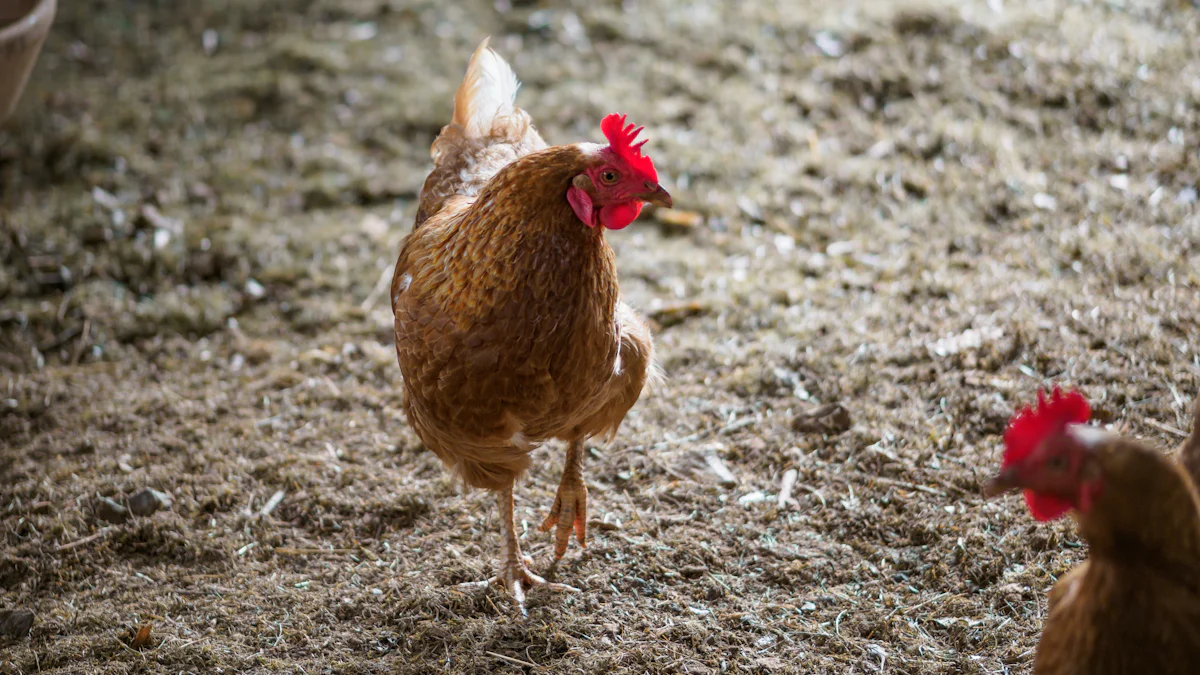
Picky Neb Dried Mealworms vs. Soy-Based Feeds
Nutritional differences and advantages of mealworms.
Soy-based feeds have long been a staple in poultry diets due to their protein content. However, Picky Neb Dried Mealworms offer a more concentrated and efficient protein source. Mealworms contain up to 53% protein, surpassing the protein levels found in soy-based feeds. Additionally, mealworms provide essential amino acids that are crucial for chickens’ growth, egg production, and feather health. Unlike soy, mealworms also deliver beneficial fatty acids, enhancing the overall nutritional profile.
Mealworms are easier for chickens to digest compared to soy-based feeds. Soy contains anti-nutritional factors, such as trypsin inhibitors, which can interfere with protein absorption. In contrast, mealworms are free from these inhibitors, ensuring chickens can fully utilize the nutrients provided. This makes mealworms a superior choice for meeting poultry’s dietary needs.
Addressing concerns about soy in chicken diets.
Soy-based feeds often raise concerns among chicken owners. Many soy products are genetically modified, which may not align with the preferences of those seeking natural or organic feeding options. Additionally, soy cultivation contributes to deforestation and environmental degradation, making it less sustainable. By choosing Picky Neb Dried Mealworms, chicken owners can avoid these issues while providing a high-quality, eco-friendly protein source for their flock.
Picky Neb Dried Mealworms vs. Fish Meal
Why mealworms are a more sustainable and palatable option.
Fish meal has been a traditional protein source in poultry diets, but it comes with significant drawbacks. Overfishing and the depletion of marine resources make fish meal an unsustainable choice. In contrast, mealworms can be reared on organic waste, reducing the reliance on conventional feed resources and minimizing environmental impact. This sustainable production process positions mealworms as an eco-friendly alternative to fish meal.
Chickens also find mealworms more palatable than fish meal. The natural appeal of mealworms aligns with chickens’ instinct to forage for insects, making them a familiar and enjoyable treat. Fish meal, on the other hand, can impart an undesirable taste to eggs, which may affect their marketability. Picky Neb Dried Mealworms provide a clean, natural protein source without compromising egg quality.
Cost and availability comparison.
Fish meal often fluctuates in price due to limited availability and high demand in aquaculture industries. Mealworms, being more sustainable and easier to produce, offer a more stable and cost-effective option. The long shelf life of dried mealworms further enhances their value, allowing chicken owners to store them conveniently without the risk of spoilage. This makes Picky Neb Dried Mealworms a practical and economical choice for poultry nutrition.
Picky Neb Dried Mealworms vs. Table Scraps
The risks of relying on table scraps for protein.
Table scraps may seem like a convenient way to supplement a chicken’s diet, but they come with significant risks. Scraps often lack the balanced nutrients chickens need, leading to potential deficiencies. Additionally, certain foods, such as onions or chocolate, can be harmful or even toxic to chickens. Relying on table scraps can result in inconsistent protein intake, negatively affecting growth, egg production, and overall health.
How mealworms provide a consistent and balanced protein source.
Picky Neb Dried Mealworms offer a reliable and nutrient-dense alternative to table scraps. Their high protein content ensures chickens receive the essential nutrients required for optimal performance. Unlike scraps, mealworms provide a consistent and balanced source of protein, eliminating the guesswork in feeding. By incorporating mealworms into their diet, chicken owners can ensure their flock thrives without the risks associated with table scraps.
Practical Benefits for Chicken Owners
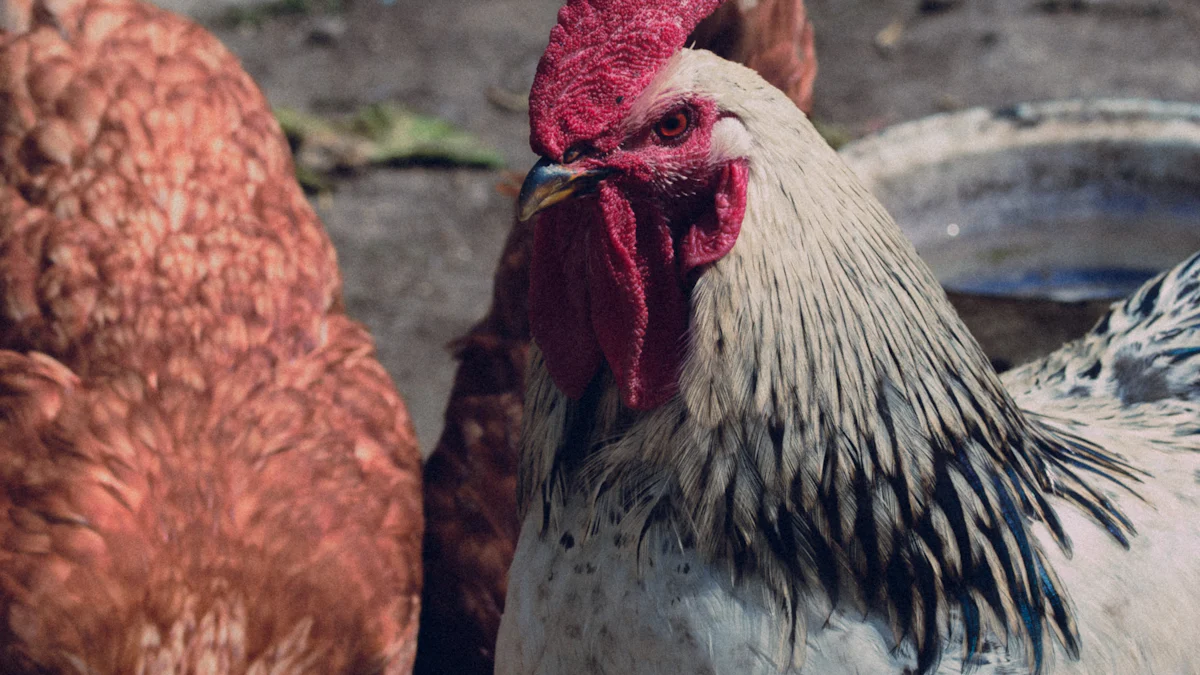
Easy to Store and Use
Long shelf life and minimal storage requirements.
Picky Neb Dried Mealworms offer exceptional convenience for chicken owners. Their long shelf life ensures that they remain fresh and ready to use for extended periods. Unlike other protein sources that may require refrigeration or special handling, these mealworms come in sturdy, resealable bags that protect them from moisture and pests. This packaging simplifies storage, making it easy to keep them in a pantry or feed room without taking up much space. The dust-free nature of the product further enhances its usability, ensuring a clean and hassle-free feeding experience.
How Picky Neb Dried Mealworms simplify feeding routines.
Feeding chickens becomes a straightforward task with Picky Neb Dried Mealworms. Their lightweight and easy-to-handle form allow chicken owners to distribute them quickly and efficiently. Whether scattered on the ground to encourage natural foraging or mixed into regular feed, these mealworms integrate seamlessly into daily routines. Their versatility eliminates the need for complex preparation, saving time and effort while ensuring chickens receive a nutritious supplement.
Cost-Effective Solution
Why mealworms are a budget-friendly option in the long run.
Investing in Picky Neb Dried Mealworms proves to be a cost-effective choice for poultry nutrition. Their high protein content means smaller quantities are needed to meet chickens’ dietary requirements, reducing overall feed costs. Additionally, their long shelf life minimizes waste, as they do not spoil quickly like fresh or perishable feed options. This durability ensures that chicken owners get the most value out of every purchase, making mealworms an economical solution for maintaining a healthy flock.
Reducing waste and maximizing feed efficiency.
Mealworms contribute to efficient feeding practices by providing a concentrated source of nutrients. Unlike table scraps or other inconsistent protein sources, they deliver a balanced and reliable nutritional profile. This consistency reduces the likelihood of overfeeding or underfeeding, optimizing feed usage and minimizing waste. By incorporating Picky Neb Dried Mealworms into their feeding regimen, chicken owners can ensure that every ounce of feed contributes to their flock’s health and productivity.
Encourages Healthy Behaviors
How Picky Neb Dried Mealworms can be used as a treat to train and bond with chickens.
Chickens respond enthusiastically to mealworms, making them an excellent tool for training and bonding. Offering Picky Neb Dried Mealworms as a treat encourages chickens to approach their owners, fostering trust and interaction. This positive reinforcement can be particularly useful for hand-feeding or teaching chickens to return to their coop. The rewarding nature of mealworms strengthens the bond between chickens and their caretakers, enhancing the overall poultry-keeping experience.
Promoting foraging and natural behaviors in the flock.
Mealworms align with chickens’ instinctive foraging behaviors, promoting physical activity and mental stimulation. Scattering Picky Neb Dried Mealworms across the coop or yard encourages chickens to scratch and peck, mimicking their natural habits. This activity not only keeps chickens engaged but also supports their overall well-being. By incorporating mealworms into their diet, chicken owners can create an enriching environment that nurtures both the physical and behavioral health of their flock.
How to Incorporate Picky Neb Dried Mealworms into a Chicken’s Diet
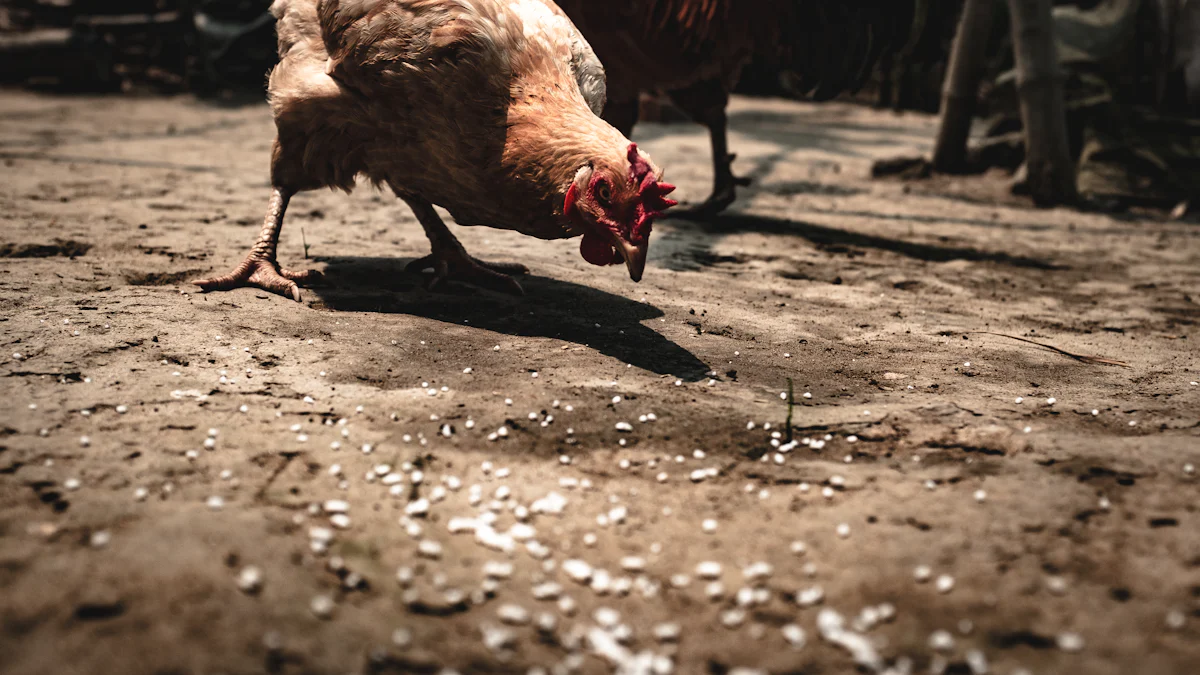
Recommended Feeding Amounts
How much mealworms to feed based on flock size and needs.
Feeding the right amount of mealworms ensures chickens receive optimal nutrition without overindulgence. For small flocks of 5-10 chickens, offering approximately 10-15 grams of dried mealworms per bird daily provides sufficient protein supplementation. Larger flocks may require proportionate adjustments based on the number of birds and their specific dietary needs. During periods of increased nutritional demand, such as molting or cold weather, slightly increasing the quantity can help meet their heightened requirements.
It is essential to monitor the flock’s behavior and health when introducing mealworms. Overfeeding can lead to imbalances in their diet, so maintaining moderation is key. Observing how chickens respond to the mealworms helps determine the ideal feeding amount for long-term benefits.
Balancing mealworms with other feed components.
Mealworms should complement, not replace, a chicken’s primary feed. A balanced diet includes grains, vegetables, and other protein sources alongside mealworms. Mixing mealworms with layer pellets or scratch grains ensures chickens receive a diverse range of nutrients. For laying hens, combining mealworms with calcium-rich feed supports strong eggshell production.
Providing mealworms as a supplement rather than a staple prevents over-reliance on a single protein source. This approach maintains dietary variety, which is crucial for overall health and productivity. Regularly rotating mealworms with other treats like fresh greens or seeds keeps the diet engaging and nutritionally complete.
Best Practices for Feeding
When and how to offer mealworms for maximum benefit.
Offering mealworms at specific times maximizes their nutritional impact. Early morning feeding aligns with chickens’ natural foraging instincts, providing an energy boost to start the day. Alternatively, mealworms can be given in the evening to help chickens replenish nutrients after a day of activity.
Scattering mealworms across the coop or yard encourages natural foraging behaviors. This method not only stimulates physical activity but also reduces boredom. For convenience, mixing mealworms into the regular feed simplifies the process while ensuring consistent intake.
Tips for introducing mealworms to picky eaters.
Some chickens may hesitate to try new foods, including mealworms. Gradual introduction helps overcome this reluctance. Start by mixing a small amount of mealworms with their usual feed. Over time, increase the proportion as they grow accustomed to the taste and texture.
Hand-feeding mealworms can also encourage picky eaters to try them. This method builds trust between the chickens and their caretaker, making the feeding experience more interactive. Observing flock dynamics ensures all chickens, including timid ones, have access to the mealworms.
Creative Ways to Use Mealworms
Mixing mealworms with other feed for variety.
Combining mealworms with other feed ingredients adds variety to the diet. Mixing them with grains, seeds, or vegetable scraps creates a nutrient-rich blend that appeals to chickens. This approach ensures they consume a balanced mix of proteins, carbohydrates, and vitamins.
Layering mealworms within a feed trough or scattering them over fresh greens enhances the feeding experience. The combination of textures and flavors keeps chickens engaged and motivated to eat. Regularly changing the mix prevents monotony and maintains their interest in the feed.
Using mealworms as a reward or enrichment activity.
Mealworms serve as excellent rewards for training and enrichment. Offering them during training sessions encourages chickens to learn new behaviors, such as returning to the coop or following commands. This positive reinforcement strengthens the bond between chickens and their caretaker.
Scattering mealworms in different areas of the coop or yard promotes exploration and natural foraging. Hiding them under straw or in treat dispensers adds an element of challenge, stimulating mental activity. These enrichment activities keep chickens active and entertained, contributing to their overall well-being.
Picky Neb Dried Mealworms provide an exceptional protein source for chickens, ensuring their nutritional needs are met with ease. Their high protein content supports growth, egg production, and overall health, making them a vital addition to any flock’s diet. These mealworms stand out for their efficiency, sustainability, and natural composition, offering a safe and reliable option for poultry owners. By incorporating them into daily feeding routines, chicken owners can promote healthier, more productive flocks while simplifying their care practices. Choosing Picky Neb Dried Mealworms ensures chickens thrive in every stage of life.
FAQ
What are the feeding guidelines for Picky Neb Dried Mealworms?
Picky Neb Dried Mealworms provide a high-protein, nutrient-rich supplement suitable for chickens, ducks, wild birds, turtles, and other animals. These mealworms are non-GMO, free from preservatives, additives, and dust, ensuring a safe and natural feeding option. They do not require refrigeration, making them easy to incorporate into daily feeding routines. For optimal results, feed mealworms in moderation as a supplement to a balanced diet.
What are the storage tips for Picky Neb Dried Mealworms?
Picky Neb Dried Mealworms come in durable, resealable bags designed for convenience and freshness. Store them in a cool, dry place away from direct sunlight to maintain their quality. Refrigeration is unnecessary, simplifying storage requirements. The resealable packaging also protects the mealworms from moisture and pests, ensuring they remain fresh for extended periods.
Are dried mealworms a convenient treat for chickens?
Yes, dried mealworms are an excellent treat for chickens. They provide a concentrated source of protein, especially beneficial for chickens that lack access to animal-based proteins through foraging. Their lightweight and easy-to-handle form make them a practical choice for chicken owners. Additionally, mealworms can be used as a reward or enrichment activity, encouraging natural behaviors like foraging.
How can mealworms be used as a feed source for birds?
Mealworms serve as a sustainable and nutritious feed source for birds. They are rich in protein and can be grown using food waste and excess vegetable matter, making them an eco-friendly option. Wild birds, in particular, are attracted to mealworms, making them ideal for backyard bird enthusiasts. Simply scatter mealworms in feeding areas or mix them with birdseed to provide a balanced diet.
Do Picky Neb Dried Mealworms require refrigeration?
No, Picky Neb Dried Mealworms do not require refrigeration. Their low moisture content and resealable packaging ensure long shelf life without the need for cold storage. This feature makes them a convenient and hassle-free option for poultry and pet owners.
Can mealworms be used for animals other than chickens?
Yes, mealworms are versatile and suitable for various animals. In addition to chickens, they can be fed to ducks, wild birds, turtles, reptiles, and even some fish. Their high protein content and natural composition make them a valuable dietary supplement for a wide range of species.
How do mealworms support egg production in chickens?
Mealworms provide essential nutrients like protein, iron, and magnesium, which are crucial for egg production. Protein supports the development of healthy eggs, while magnesium aids calcium absorption, ensuring strong eggshells. Regular supplementation with mealworms helps laying hens maintain consistent and high-quality egg production.
Are Picky Neb Dried Mealworms eco-friendly?
Yes, Picky Neb Dried Mealworms are an eco-friendly protein source. Mealworms require minimal resources to produce and can be reared on organic waste, reducing environmental impact. Compared to traditional protein sources like soy or fish meal, mealworms have a smaller carbon footprint, making them a sustainable choice for animal feed.
How can mealworms be introduced to picky eaters?
Introducing mealworms to hesitant eaters requires patience. Start by mixing a small amount of mealworms with their regular feed. Gradually increase the quantity as they become accustomed to the new addition. Hand-feeding mealworms can also encourage timid animals to try them, fostering trust and interaction between the caretaker and the flock.
What makes Picky Neb Dried Mealworms a reliable choice?
Picky Neb Dried Mealworms stand out for their quality and convenience. They are non-GMO, free from additives, and packaged in resealable bags for easy storage. Their high protein content ensures a consistent and balanced nutritional boost for animals. Additionally, the brand offers a money-back guarantee, reflecting their commitment to customer satisfaction.


